
Gnassingbé Eyadéma was a Togolese military officer and politician who was the president of Togo from 1967 until his death in 2005, after which he was immediately succeeded by his son, Faure Gnassingbé.
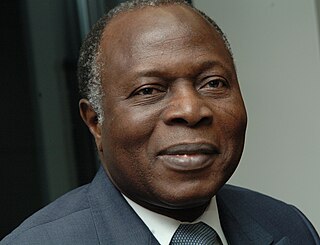
Koffi Sama was the Prime Minister of Togo from 29 June 2002 to 9 June 2005.

Elections in Togo take place within the framework of a presidential system. Both the President and the National Assembly are directly elected by voters. Togo is a one party dominant state with the Union for the Republic in power.

Faure Essozimna Gnassingbé is a Togolese politician who has been the president of Togo since 2005. Before assuming the presidency, he was appointed by his father, President Gnassingbé Eyadéma, as Minister of Equipment, Mines, Posts, and Telecommunications, serving from 2003 to 2005.
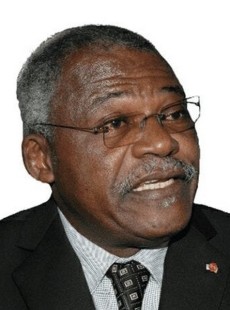
El-Hadj Bonfoh Abass was a Togolese politician who was the interim President of Togo from 25 February 2005 to 4 May 2005. He was the President of the National Assembly of Togo from February 2005 to July 2013.

Édouard Kodjovi "Edem" Kodjo, was a Togolese politician and diplomat. He was Secretary-General of the Organisation of African Unity from 1978 to 1983; later, in Togo, he was a prominent opposition leader after the introduction of multi-party politics. He served as Prime Minister from 1994 to 1996 and again from 2005 to 2006. Kodjo was President of the Patriotic Pan-African Convergence (CPP). Kodjo died on April 11, 2020, in Paris.
Fambaré Ouattara Natchaba was a Togolese politician. He was the President of the National Assembly of Togo from September 2000 to February 2005. He was a prominent member of the ruling Rally of the Togolese People (RPT) and a member of the Pan-African Parliament representing Togo.
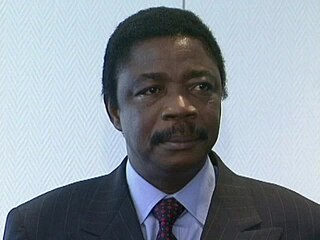
Kwassi Klutse was a Togolese politician who was the prime minister of Togo from 20 August 1996 to 21 May 1999.

Gilchrist Olympio is a Togolese politician who was a long-time opponent of the regime of Gnassingbé Eyadéma and was President of the Union of Forces for Change (UFC), Togo's main opposition party from the 1990s til 2013. Olympio is the son of Sylvanus Olympio, Togo's first President, who was assassinated in a 1963 coup. He is now an ally of the current regime of Faure Gnassingbe, the son of the late President.

The Rally of the Togolese People was the ruling political party in Togo from 1969 to 2012. It was founded by President Gnassingbé Eyadéma and headed by his son, President Faure Gnassingbé, after the former's death in 2005. Faure Gnassingbé replaced the RPT with a new ruling party, the Union for the Republic (UNIR), in April 2012, dissolving the RPT.
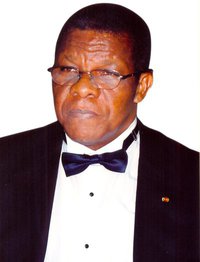
Joseph Kokou Koffigoh is a Togolese politician, human rights activist, and a poet who served as Prime Minister of Togo from 27 August 1991 to 23 April 1994. Elected as Prime Minister by the opposition-dominated National Conference in 1991, Koffigoh was given full executive powers and tasked with overseeing a transition to multiparty elections. Beginning in December 1991, however, President Gnassingbé Eyadéma increasingly reasserted his authority at Koffigoh's expense. Although Koffigoh remained in office, the opposition eventually abandoned him, feeling he had become too cooperative with Eyadéma.
Solitoki Magnim Esso is a Togolese politician who has served in the government of Togo as Minister of State for Presidential Affairs since September 2013. He served in the government as Minister of Communication and Culture during the 1990s; later, he was Minister of State for the Civil Service and Administrative Reform from May 2010 to August 2012 and Minister of State for Primary and Secondary Education from August 2012 to September 2013. He was elected as Secretary-General of the Rally of the Togolese People (RPT) in December 2006.
Yawovi Madji Agboyibo was a Togolese attorney and politician. He served as Prime Minister of Togo from September 2006 to December 2007 and was National President of the Action Committee for Renewal (CAR), an opposition political party, from 1991 to 2008. He was the Honorary President of the CAR.
Barry Moussa Barqué is a Togolese politician who served in the government of Togo under President Gnassingbé Eyadéma for most of the period from 1979 to 1999. He has been a Special Adviser to the President since 1999.
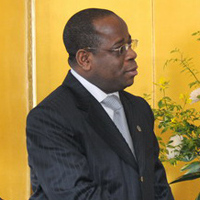
Komlan Mally is a Togolese politician who served as Prime Minister of Togo from December 2007 to September 2008. He was Minister of State for Health from September 2008 to June 2011.
Komi Sélom Klassou is a Togolese politician who served as Prime Minister of Togo from 2015 to 2020. A member of the ruling Union for the Republic (UNIR), he served as Minister of Culture, Youth and Sports from 2000 to 2003, as Minister of Primary and Secondary Education from 2003 to 2007, and as First Vice-President of the National Assembly from 2007 to 2015.
Maurice Dahuku Péré was a Togolese politician who was President of the National Assembly of Togo from 1994 to 1999. He was the national president of the Democratic Alliance for the Fatherland, an opposition party.
Kwame-Mensah Jacques Amouzou is a Togolese politician and businessman. An ethnic Ewe, Amouzou was a minor candidate in both the 1993 and 1998 presidential elections. He is the President of the Union of Independent Liberals (ULI). Amouzou was "widely perceived as a front" for President Gnassingbé Eyadéma during the 1990s.

Atsutsè Kokouvi Agbobli was a Togolese politician. He served in the government under President Gnassingbé Eyadéma and was the President of the Movement for National Development (MODENA), an opposition party.
Issifou Okoulou-Kantchati was a Togolese politician, who last served in the government of Togo as Minister of City Planning and Housing.












